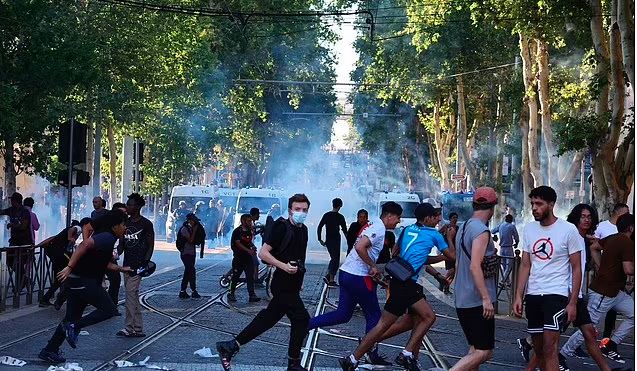
Police arrested 1,311 people overnight Friday to Saturday, the highest figure since the violent protests began over the point-blank shooting by a policeman of Nahel M. in the western Paris suburb of Nanterre on Tuesday.
Shops were ransacked and town halls attacked in various locations across the country by gangs, often made up of teens organised on social media and armed with fireworks.
Interior Minister Gerald Darmanin told reporters that 45,000 members of the security forces would be deployed overnight Saturday to Sunday — the same number as the night before. But extra forces and equipment had been sent to Lyon, Grenoble and Marseille, which saw the worst rioting the previous night.
Paris and its nearby regions would be policed by 7,000 officers, he said.
Numbers would be “considerably reinforced” in these cities “in order to completely restore republican order”, Darmanin said.
The protests over the death of the teen, who was of Algerian origin, have again exposed the severe racial tensions in modern France and increased scrutiny on the police who have long been accused of singling out minorities.
The crisis is a hugely unwelcome development for President Emmanuel Macron, who was looking forward to pressing on with his second mandate after seeing off months of protests that erupted in January over raising the pensions age.
In a sign of the seriousness of the crisis, he postponed a state visit to Germany scheduled to begin Sunday.
The German presidency announced that Macron had spoken by telephone with German President Frank-Walter Steinmeier “and informed him of the situation in his country”.
Nahel’s funeral ceremony was held in the Paris suburb of Nanterre where he lived, with hundreds gathering peacefully along with his mother and grandmother.
A ceremony took place in the early afternoon at the mosque in Nanterre with the interment taking place in the giant Mont Valerien cemetery in the area.
It finished at 1530 GMT and was marked by “reflection and without incidents”, a witness told AFP.
In a rare intervention on a social issue, the French national football team, many of whose top players are of minority background, joined calls for an end to the clashes.
“The time of violence must give way to that of mourning, dialogue and reconstruction,” the team said in a statement posted on social media by captain and Paris Saint-Germain superstar Kylian Mbappe.
In a bid to limit the violence, buses and trams in France have stopped running after 9:00 pm (1900 GMT) and the sale of large fireworks and inflammable liquids has been banned.
The southern port city of Marseille has been the scene of clashes and looting from the centre and further north in the long-neglected low-income neighbourhoods that Macron visited at the start of the week.
Authorities in Marseille are going a step further by halting all urban transport from 6:00 pm, including metros, and banning all protests up until Sunday.
Police reinforcements have been sent to the city, including armoured vehicles and two helicopters.
Macron has urged parents to take responsibility for underage rioters, one-third of whom were “young or very young”.
Justice Minister Eric Dupond-Moretti said Saturday that 30 percent of those arrested were minors while Darmanin said the average age of those arrested was just 17.
The unrest has raised concerns abroad, with France hosting the Rugby World Cup in the autumn and the Paris Olympic Games in the summer of 2024.
Britain and other European countries updated their travel advice to warn tourists to stay away from areas affected by the rioting.
The unrest has had a major impact on cultural events in France with singer Mylene Farmer forced to cancel stadium concerts and French fashion house Celine cancelling its menswear show in Paris scheduled for this weekend.
A 38-year-old policeman has been charged with voluntary homicide over the teenager’s death and has been remanded in custody.
The UN rights office said Friday that the killing of the teen of North African descent was “a moment for the country to seriously address the deep issues of racism and racial discrimination in law enforcement”.
The French foreign ministry dismissed the criticism, saying any suggestion of systemic discrimination in the police force was “totally unfounded”.
AFP





